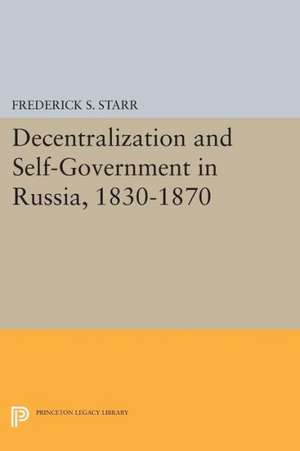Decentralization and Self–Government in Russia, 1830–1870: Princeton Legacy Library
Autor Frederick S. Starren Limba Engleză Paperback – 15 feb 2015
| Toate formatele și edițiile | Preț | Express |
|---|---|---|
| Paperback (1) | 505.76 lei 6-8 săpt. | |
| Princeton University Press – 15 feb 2015 | 505.76 lei 6-8 săpt. | |
| Hardback (1) | 956.43 lei 6-8 săpt. | |
| Princeton University Press – 18 apr 2016 | 956.43 lei 6-8 săpt. |
Din seria Princeton Legacy Library
-
 Preț: 437.79 lei
Preț: 437.79 lei - 16%
 Preț: 2324.11 lei
Preț: 2324.11 lei -
 Preț: 223.24 lei
Preț: 223.24 lei -
 Preț: 313.18 lei
Preț: 313.18 lei - 23%
 Preț: 780.26 lei
Preț: 780.26 lei -
 Preț: 376.99 lei
Preț: 376.99 lei - 16%
 Preț: 915.48 lei
Preț: 915.48 lei -
 Preț: 377.31 lei
Preț: 377.31 lei - 16%
 Preț: 882.80 lei
Preț: 882.80 lei - 16%
 Preț: 736.40 lei
Preț: 736.40 lei - 16%
 Preț: 860.09 lei
Preț: 860.09 lei -
 Preț: 340.11 lei
Preț: 340.11 lei -
 Preț: 362.12 lei
Preț: 362.12 lei - 16%
 Preț: 683.63 lei
Preț: 683.63 lei -
 Preț: 363.10 lei
Preț: 363.10 lei -
 Preț: 172.27 lei
Preț: 172.27 lei -
 Preț: 340.22 lei
Preț: 340.22 lei - 16%
 Preț: 835.12 lei
Preț: 835.12 lei -
 Preț: 266.84 lei
Preț: 266.84 lei -
 Preț: 317.65 lei
Preț: 317.65 lei -
 Preț: 329.09 lei
Preț: 329.09 lei -
 Preț: 265.73 lei
Preț: 265.73 lei -
 Preț: 260.54 lei
Preț: 260.54 lei -
 Preț: 314.84 lei
Preț: 314.84 lei -
 Preț: 402.66 lei
Preț: 402.66 lei -
 Preț: 464.18 lei
Preț: 464.18 lei -
 Preț: 351.09 lei
Preț: 351.09 lei -
 Preț: 483.81 lei
Preț: 483.81 lei - 19%
 Preț: 500.29 lei
Preț: 500.29 lei -
 Preț: 388.44 lei
Preț: 388.44 lei -
 Preț: 328.48 lei
Preț: 328.48 lei - 23%
 Preț: 742.04 lei
Preț: 742.04 lei -
 Preț: 372.92 lei
Preț: 372.92 lei -
 Preț: 328.70 lei
Preț: 328.70 lei - 19%
 Preț: 505.89 lei
Preț: 505.89 lei -
 Preț: 289.17 lei
Preț: 289.17 lei -
 Preț: 446.25 lei
Preț: 446.25 lei - 19%
 Preț: 575.53 lei
Preț: 575.53 lei -
 Preț: 447.20 lei
Preț: 447.20 lei -
 Preț: 484.19 lei
Preț: 484.19 lei -
 Preț: 271.12 lei
Preț: 271.12 lei -
 Preț: 314.46 lei
Preț: 314.46 lei -
 Preț: 362.51 lei
Preț: 362.51 lei -
 Preț: 307.07 lei
Preț: 307.07 lei - 19%
 Preț: 498.46 lei
Preț: 498.46 lei -
 Preț: 272.27 lei
Preț: 272.27 lei - 19%
 Preț: 458.44 lei
Preț: 458.44 lei -
 Preț: 406.20 lei
Preț: 406.20 lei - 19%
 Preț: 515.73 lei
Preț: 515.73 lei -
 Preț: 428.88 lei
Preț: 428.88 lei
Preț: 505.76 lei
Nou
Puncte Express: 759
Preț estimativ în valută:
96.79€ • 105.10$ • 81.30£
96.79€ • 105.10$ • 81.30£
Carte tipărită la comandă
Livrare economică 22 aprilie-06 mai
Preluare comenzi: 021 569.72.76
Specificații
ISBN-13: 9780691619675
ISBN-10: 0691619670
Pagini: 400
Dimensiuni: 163 x 233 x 22 mm
Greutate: 0.56 kg
Editura: Princeton University Press
Seria Princeton Legacy Library
ISBN-10: 0691619670
Pagini: 400
Dimensiuni: 163 x 233 x 22 mm
Greutate: 0.56 kg
Editura: Princeton University Press
Seria Princeton Legacy Library
Descriere
Descriere de la o altă ediție sau format:
The turbulent period of renewal and innovation that followed Russia's crushing defeat in the Crimea has been interpreted, historically, in terms of the emancipation of the serfs and the evolution of the gentry class. But, contends Frederick Starr, such an approach underestimates the breadth and intensity of the impulse for local reforms per se. Aft
The turbulent period of renewal and innovation that followed Russia's crushing defeat in the Crimea has been interpreted, historically, in terms of the emancipation of the serfs and the evolution of the gentry class. But, contends Frederick Starr, such an approach underestimates the breadth and intensity of the impulse for local reforms per se. Aft
